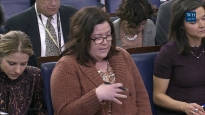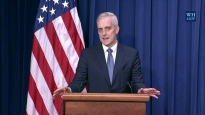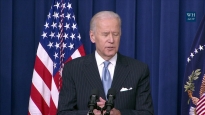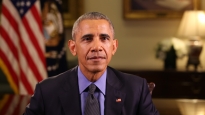President Obama Speaks on Student Loan Debt
June 09, 2014 | 20:14 | Public Domain
President Obama delivers remarks about the need to make college more affordable, before signing a memorandum outlining new executive actions to support federal student loan borrowers.
Remarks by the President on Opportunity for All: Making College More Affordable
1:51 P.M. EDT
THE PRESIDENT: Thank you. Everybody have a seat. Welcome to the White House. And I want to thank Andy for the terrific introduction. And this is commencement season, and it’s always a hopeful and exciting time, and I’ll bet we might have some folks who just graduated here today. Raise your hands. Let’s see -- yes, we’ve got a couple of folks who are feeling pretty good. (Laughter.)
Of course, once the glow wears off, this can be a stressful time for millions of students. And they’re asking themselves, how on Earth am I going to pay off all these student loans? And that’s what we’re here to talk about. And Andy I think gave a vivid example of what’s going through the minds of so many young people who have the drive and the energy and have succeeded in everything that they do but because of family circumstances have found themselves in a situation where they’ve got significant debt.
Now, we know, all of you know, that in a 21st century economy, a higher education is the single best investment that you can make in yourselves and your future, and we’ve got to make sure that investment pays off.
And here’s why: For 51 months in a row, our businesses have created new jobs -- 9.4 million new jobs in total. And over the last year, we’ve averaged around 200,000 new jobs every month. That’s the good news. But while those at the top are doing better than ever, average wages have barely budged. And there are too many Americans out there that are working harder and harder just to get by.
Everything I do is aimed towards reversing those trends that put a greater burden on the middle class and are diminishing the number of ladders to get into the middle class, because the central tenet of my presidency, partly because of the story of my life and Michelle’s life, is this is a country where opportunity should be available for anybody -- the idea that no matter who you are, what you look like, where you come from, how you were raised, who you love, if you’re willing to work hard, if you’re willing to live up to your responsibilities, you can make it here in America.
And in America, higher education opens the doors of opportunity for all. And it doesn’t have to be a four-year college education. We’ve got community colleges, we’ve got technical schools, but we know that some higher education, some additional skills is going to be your surest path to the middle class. The typical American with a bachelor’s degree or higher earns over $28,000 more per year than somebody with just a high school education -- 28 grand a year. And right now, the unemployment rate for workers with a bachelor’s degree is about half of what it is for folks with just a high school education.
So you know that this is a smart investment. Your parents know this is a smart investment. That’s why so many of them made such big sacrifices to make sure that you could get into college, and nagged you throughout your high school years. (Laughter.)
Here’s the problem: At a time when higher education has never been more important, it’s also never been more expensive. Over the last three decades, the average tuition at a public university has more than tripled. At the same time, the typical family’s income has gone up just 16 percent.
Michelle and I both went to college because of loans and grants and the work that we did. But I’ll be honest with you -- now, I’m old, I’ve got to admit -- (laughter) -- but when I got out of school, it took me about a year to pay off my entire undergraduate education. That was it. And I went to a private school; I didn’t even go to a public school. So as recently as the ‘70s, the ‘80s, when you made a commitment to college, you weren’t anticipating that you’d have this massive debt on the back end.
Now, when I went to law school it was a different story. But that made sense because the idea was if you got a professional degree like a law degree, you would probably be able to pay it off. And so I didn’t feel sorry for myself or any lawyers who took on law school debt.
But compare that experience just half a generation, a generation ago to what kids are going through now. These rising costs have left middle-class families feeling trapped. Let’s be honest: Families at the top, they can easily save more than enough money to pay for school out of pocket. Families at the bottom face a lot of obstacles, but they can turn to federal programs designed to help them handle costs. But you’ve got a lot of middle-class families who can’t build up enough savings, don’t qualify for support, feel like nobody is looking out for them. And as Andy just described vividly, heaven forbid that the equity in their home gets used up for some other family emergency, or, as we saw in 2008, suddenly home values sink, and then people feel like they’re left in the lurch.
So I’m only here because this country gave me a chance through education. We are here today because we believe that in America, no hardworking young person should be priced out of a higher education.
This country has always made a commitment to put a good education within the reach of young people willing to work for it. I mentioned my generation, but think about my grandfather’s generation. I just came back from Normandy, where we celebrated D-Day. When that generation of young people came back from World War II, at least the men, my grandfather was able to go to college on the GI Bill. And that helped build the greatest middle class the world has ever known.
Grants helped my mother raise two kids by herself while she got through school. And she didn’t have $75,000 worth of debt, and she was raising two kids at the same time. Neither Michelle or I came from a lot of money, but with hard work, and help from scholarships and student loans, we got to go to great schools. We did not have this kind of burden that we’re seeing, at least at the undergraduate stages. As I said, because of law school, we only finished paying off our own student loans just 10 years ago. So we know what many of you are going through or look forward -- or don’t look forward to. (Laughter.) And we were doing it at the same time -- we already had to start saving for Malia and Sasha’s education.
But this is why I feel so strongly about this. This is why I’m passionate about it. That’s why we took on a student loan system that basically gave away tens of billions of taxpayer dollars to big banks. We said, let’s cut out the middle man. Banks should be making a profit on what they do, but not off the backs of students. We reformed it; more money went directly to students. We expanded grants for low-income students through the Pell grant program. We created a new tuition tax credit for middle-class families. We offered millions of young people the chance to cap their student loan payments at 10 percent of their income -- that’s what Andy was referring to. Michelle right now is working with students to help them “Reach Higher,” and overcome the obstacles that stand between them and graduation. This is something we are deeply invested in.
But as long as college costs keep soaring, we can’t just keep throwing money at the problem. We’re going to have to initiate reforms from the colleges themselves. States have to invest more in higher education. Historically, the reason we had such a great public education system, public higher education system was states understood we will benefit if we invest in higher education. And somewhere along the line, they started thinking, we’ve got to invest more in prisons than we do in higher education. And part of the reason that tuition has been jacked up year after year after year is state legislators are not prioritizing this. They’re passing the costs onto taxpayers. It’s not sustainable.
So that’s why I laid out a plan to shake up our higher education system and encourage colleges to finally bring down college costs. And I proposed new rules to make sure for-profit colleges keep their promises and train students with the skills for today’s jobs without saddling them with debt. Too many of these for-profit colleges -- some do a fine job, but many of them recruit kids in, the kids don’t graduate, but they’re left with the debt. And if they do graduate, too often they don’t have the marketable skills they need to get the job that allows them to service the debt.
None of these fights have been easy. All of them have been worth it. You’ve got some outstanding members of Congress right here who have been fighting right alongside us to make sure that we are giving you a fair shake. And the good news is, more young people are earning college degrees than ever before. And that’s something we should be proud of, and that’s something we should celebrate.
But more of them are graduating with debt. Despite everything we’re doing, we’re still seeing too big a debt load on too many young people. A large majority of today’s college seniors have taken out loans to pay for school. The average borrower at a four-year college owes nearly $30,000 by graduation day. Americans now owe more on student loans than they do on credit cards. And the outrage here is that they’re just doing what they’ve been told they’re supposed to do. I can’t tell you how many letters I get from people who say I did everything I was supposed to and now I’m finding myself in a situation where I’ve got debts I can’t pay off, and I want to pay them off, and I’m working really hard, but I just can’t make ends meet.
If somebody plays by the rules, they shouldn’t be punished for it. A young woman named Ashley, in Santa Fe, wrote me a letter a few months ago. And Ashley wanted me to know that she’s young, she’s ambitious, she’s proud of the degree she earned. And she said, “I am the future” -- she put “am” in capital letters so that I’d know she means business. (Laughter.) And she told me that because of her student loan debt, she’s worried she’ll never be able to buy a car or a house. She wrote, “I’m not even 30, and I’ve given up on my future because I can’t afford to have one.” I wrote her back and said it’s a little early in your 20s to give up. (Laughter.) So I’m sure Ashley was trying to make a point, but it’s a point that all of us need to pay attention to. In America, no young person who works hard and plays by the rules should feel that way.
Now, I’ve made it clear that I want to work with Congress on this issue. Unfortunately, a generation of young people can’t afford to wait for Congress to get going. The members of Congress who are here are working very hard and putting forward legislation to try to make this stuff happen, but they have not gotten some of the support that they need. In this year of action, wherever I’ve seen ways I can act on my own to expand opportunity to more Americans, I have. And today, I’m going to take three actions to help more young people pay off their student loan debt.
Number one, I’m directing our Secretary of Education, Arne Duncan, to give more Americans who are already making their loan payments a chance to cap those payments at 10 percent of their income. We call it “Pay As You Earn.” We know it works, because we’ve already offered it to millions of young people. It’s saving folks like Andy hundreds of dollars potentially every month. It’s giving graduates the opportunity to pursue the dreams that inspired them to go to school in the first place, and that’s good for everybody. And we want more young people to start their own businesses. We want more young people becoming teachers and nurses and social workers. We want young people to be in a position to pursue their dreams. And we want more young people who act responsibly to be able to manage their debt over time. So we’re announcing steps that will open up “Pay As You Earn” to nearly 5 million more Americans. That’s the first action we’re taking today.
The second action is to renegotiate contracts with private companies like Sallie Mae that service our student loans. And we’re going to make it clear that these companies are in the business of helping students, not just collecting payments, and they owe young people the customer service, and support, and financial flexibility that they deserve. That’s number two.
Number three -- we’re doing more to help every borrower know all the options that are out there, so that they can pick the one that’s right for them. So we’re going to work with the teachers’ associations, and the nurses’ associations, with business groups; with the YMCA, and non-profits and companies like TurboTax and H&R Block. And tomorrow, I’m going to do a student loan Q&A with Tumblr to help spread the word -- you’re laughing because you think, what does he know about Tumblr? (Laughter.) But you will recall that I have two teenage daughters so that I am hip to all these things. (Laughter.) Plus I have all these twenty-somethings who are working for me all the time. (Laughter.)
But to give even more student borrowers the chance to save money requires action from Congress. I’m going to be signing this executive order. It’s going to make progress, but not enough. We need more. We’ve got to have Congress to make some progress. Now, the good news is, as I said, there are some folks in Congress who want to do it. There are folks here like Jim Clyburn, John Tierney, who are helping lead this fight in the House. We’ve got Elizabeth Warren, who’s leading this fight in the Senate. Elizabeth has written a bill that would let students refinance their loans at today’s lower interest rates, just like their parents can refinance a mortgage. It pays for itself by closing loopholes that allow some millionaires to pay a lower tax rate than middle-class families.
I don’t know, by the way, why folks aren’t more outraged about this. I’m going to take a pause out of my prepared text. You would think that if somebody like me has done really well in part because the country has invested in them, that they wouldn’t mind at least paying the same rate as a teacher or a nurse. There’s not a good economic argument for it, that they should pay a lower rate. It’s just clout, that’s all. So it’s bad enough that that’s already happening. It would be scandalous if we allowed those kinds of tax loopholes for the very, very fortunate to survive while students are having trouble just getting started in their lives.
So you’ve got a pretty straightforward bill here. And this week, Congress will vote on that bill. And I want Americans to pay attention to see where their lawmakers’ priorities lie here: lower tax bills for millionaires, or lower student loan bills for the middle class.
This should be a no-brainer. You’ve got a group of far-right Republicans in Congress who push this trickle-down economic plan, telling hard-working students and families, “You’re on your own.” Two years ago, Republicans in Congress nearly let student loan interest rates double for 7 million young people. Last year, they tried to strip protections from lower-income students. This year, House Republicans voted overwhelmingly to slash Pell grants and make it harder for thousands of families to afford college. If you’re a big oil company, they’ll go to bat for you. If you’re a student, good luck.
Some of these Republicans in Congress seem to believe that it’s just because -- that just because some of the young people behind me need some help, that they’re not trying hard enough. They don’t get it. Maybe they need to talk to Andy. These students worked hard to get where they are today.
Shanelle Roberson -- where is Shanelle? Shanelle is the first in her family to graduate from a four-year college. (Applause.) Shanelle is not asking for a handout, none of these folks are. They’re working hard. They’re working while they’re going to school. They’re doing exactly what we told them they should do. But they want a chance. If they do exactly what they’re told they should do, that they’re not suddenly loaded up where they’ve got so much debt that they can’t buy a house, they can’t think about starting a family, they can’t imagine starting a business on their own.
I’ve been in politics long enough to hear plenty of people, from both parties, pay lip service to the next generation, and then they abandon them when it counts. And we, the voters, let it happen. This is something that should be really straightforward, just like the minimum wage should be straightforward, just like equal pay for equal work should be straightforward. And one of the things I want all the voters out there to consider, particularly parents who are struggling trying to figure out how am I going to pay my kid’s college education, take a look and see who is that’s fighting for you and your kids, and who is it that’s not. Because if there are no consequences, then this kind of irresponsible behavior continues on the part of members of Congress.
So I ran for this office to help more young people go to college, graduate, and pay off their debt. And we’ve made some really good progress despite the best efforts of some in Congress to block that progress. Think about how much more we could do if they were not standing in the way.
This week, they have a chance to help millions of young people. I hope they do. You should let them know you are watching and paying attention to what they do. If they do not look out for you, and then throw up a whole bunch of arguments that are meant to obfuscate -- meaning confuse, rather than to clarify and illuminate -- (laughter) -- then you should call them to account. And in the meantime, I’m going to take these actions today on behalf of all these young people here, and every striving young American who shares my belief that this is a place where you can still make it if you try.
Thank you, everybody. God bless you. God bless America.
END
2:12 P.M. EDT
|
December 14, 2016
|
December 13, 2016
|
December 13, 2016
|
December 13, 2016
|
|
December 12, 2016
|
December 10, 2016
|
December 9, 2016
|
December 8, 2016
|
- &lsaquo previous
- …
- 2
- 3
- 4
- 5
- 6
- 7
- 8
- 9
- 10
- …
- next &rsaquo







